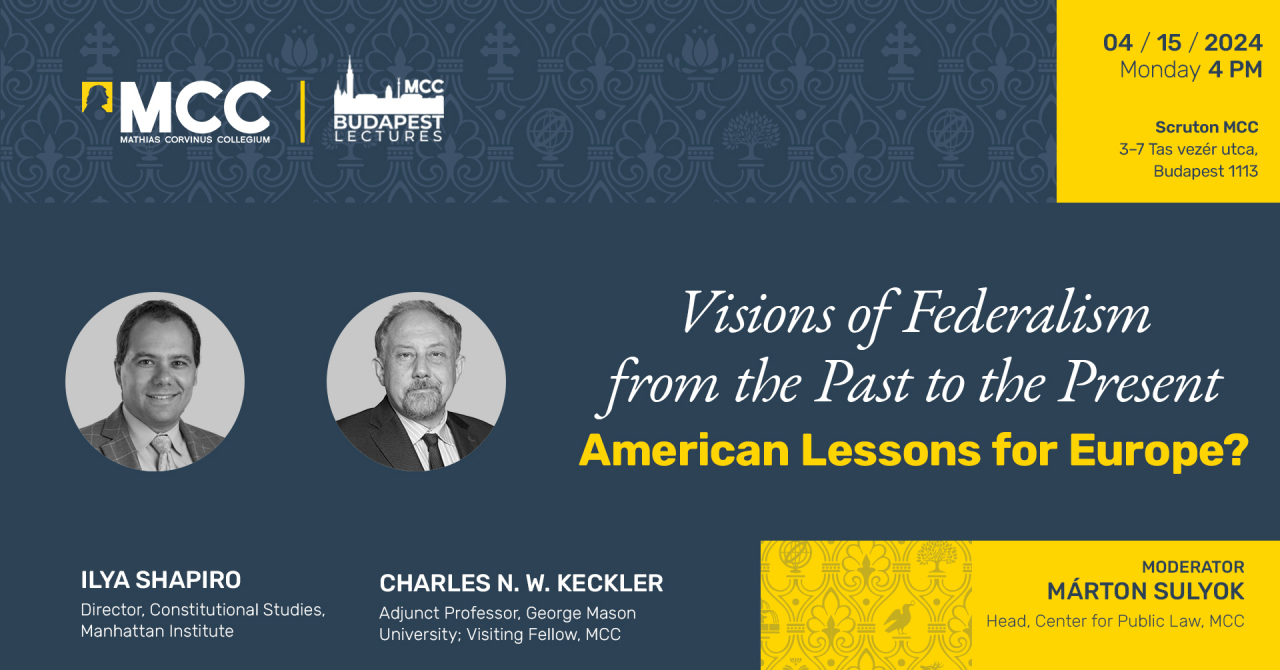In the current context of European debates about the future of Europe, the issue of federalism occupies an important space in terms of political and legal debates regarding the organization of power and the divisions of competences between the states and the Union. Ever since the dawn of the integration, a federal and a confederal vision have competed with each other in this regard. There are very important political and legal debates in American constitutional history that might shed much-needed light on those aspects of the principles of subsidiarity, sovereignty, supremacy, autonomy and participation, which are at the core of our contemporary debates in Europe when we talk about federal structures.
It is important to look at whether we understand these principles differently, and how would we be able to apply an American mold to European federalism, especially because Europe has never been such a 'large republic' as the United States were, when the federal structure has been created. Our experts, coming from a background in political science, constitutional history and law, will shed light on these issues from both a theoretical and practical point of view, as federalism appears in the American practice through the exercise of legislative, executive and judicial power.
Language: English
Program
4.00 – 4.45 PM Moderated Discussion
Ilya Shapiro, Director of Constitutional Studies, Manhattan Institute
Charles N. W. Keckler PhD, Adjunct Professor, George Mason University; Visiting Fellow, MCC
Moderator: Márton Sulyok PhD, Head of the Center for Public Law, MCC
4.45 – 5.00 PM Q&A
Ilya Shapiro is a senior fellow and director of constitutional studies at the Manhattan Institute. Previously he was executive director and senior lecturer at the Georgetown Center for the Constitution, and before that a vice president of the Cato Institute and director of Cato’s Robert A. Levy Center for Constitutional Studies.
Shapiro is the author of Lawless: The Miseducation of America’s Elites (forthcoming 2024) and Supreme Disorder: Judicial Nominations and the Politics of America’s Highest Court (2020), coauthor of Religious Liberties for Corporations? (2014), and editor of 11 volumes of the Cato Supreme Court Review (2008-18). He has contributed to a variety of academic, popular, and professional publications, including the Wall Street Journal, Harvard Journal of Law & Public Policy, Washington Post, Los Angeles Times, USA Today, National Review, and Newsweek. He also regularly provides commentary for various media outlets and once appeared on the Colbert Report.
Shapiro has testified many times before Congress and state legislatures and has filed more than 500 amicus curiae “friend of the court” briefs in the Supreme Court. He lectures regularly on behalf of the Federalist Society, is a member of the board of fellows of the Jewish Policy Center, was an inaugural Washington Fellow at the National Review Institute, and has been an adjunct law professor at the George Washington University and University of Mississippi. He is also the chairman of the board of advisers of the Mississippi Justice Institute, a barrister in the Edward Coke Appellate Inn of Court, and a former member of the Virginia Advisory Committee to the U.S. Commission on Civil Rights.
Earlier in his career, Shapiro was a special assistant/adviser to the Multi-National Force in Iraq on rule-of-law issues and practiced at Patton Boggs and Cleary Gottlieb. Before entering private practice, he clerked for Judge E. Grady Jolly of the U.S. Court of Appeals for the Fifth Circuit. He holds an AB from Princeton University, an MSc from the London School of Economics, and a JD from the University of Chicago Law School.


